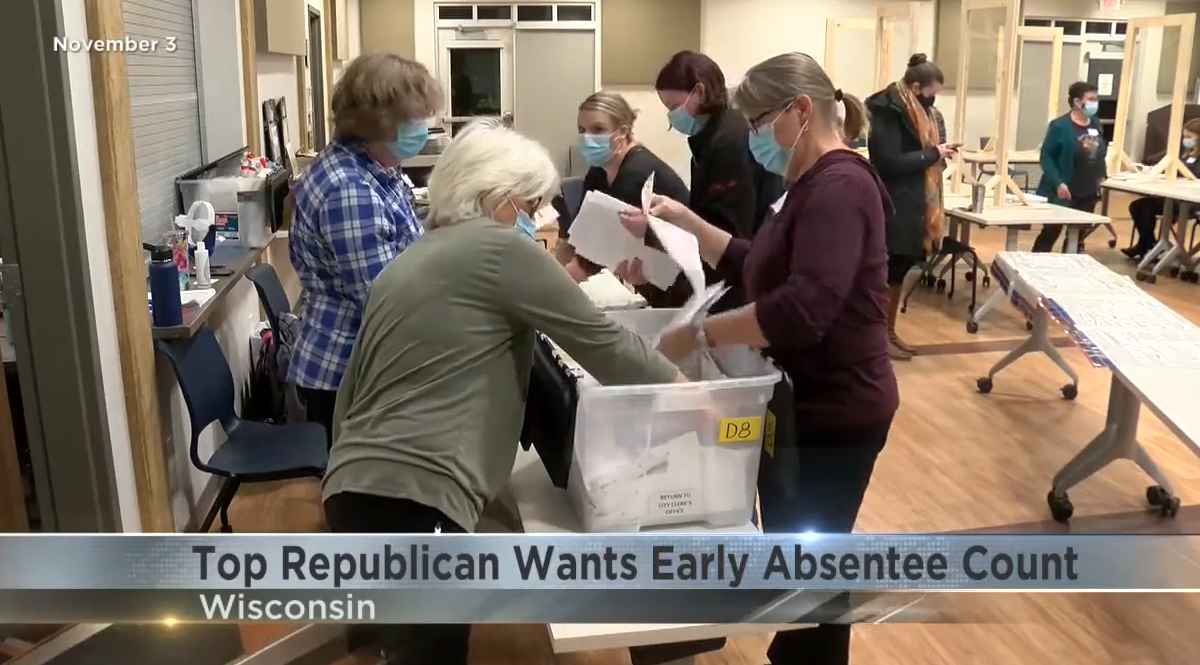While proponents of a Wisconsin absentee ballot processing bill hail it as a cure for long delays in election night vote counting, the measure would sacrifice security for speed, a Wisconsin state election integrity hawk asserts.
State Rep. Janel Brandtjen, R-Menomonee Falls, says Senate Bill 685, which would allow local election clerks to begin processing absentee ballots the day before an election, has been painted as a bipartisan panacea to a problem that has particularly plagued election nights in Milwaukee: slow vote returns.
“The idea that’s being presented is not truthful,” Brandtjen said. “This bill trades speed for security. It will lead to many more central counts in the state of Wisconsin, with almost no chain of custody on those ballots.”
The Senate Committee on Shared Revenue, Elections, and Consumer Protection held a hearing on the bill Tuesday. The measure includes other election law provisions, but it’s the ballot processing portion of the bill that most concerns opponents.
Its Assembly version, AB 567, passed last month with Brandtjen and a handful of Republicans voting against it — warning their sanguine colleagues that the proposal could aid and abet election cheats in compromising election integrity.
But the bill’s authors insist the opposite is true, that the so-called “Monday Processing Bill” would go a long way to allay the kind of fair election doubts that surfaced in the hotly contested 2020 presidential election.
Clerks would be able to verify voter eligibility and remove absentee ballots from their envelopes in preparation for the Election Day count on the Monday before elections — on Tuesdays in Wisconsin. Election officials still would be prohibited from tallying the early voting ballots until after Wisconsin’s polls close.
Chuck DeVore recently argued at The Federalist that the bill addresses the challenges of 2020 for 2024, “ensuring that Wisconsin’s electoral system is both resilient and responsive to the needs of its voters.”
“In passing SB 685, Wisconsin could set a precedent for other states grappling with similar issues, potentially improving public faith in our election process,” DeVore wrote.
He added that opening up processing the day before “would significantly shift away from the current practice where no processing occurs before polls close.” Brandtjen noted that current Wisconsin law allows the counting of absentee ballots after the polls open on Election Day in municipalities with ordinances providing for absentee ballot canvassing boards.
Contrary to the idea that the bill “does away with” central count locations, Brandtjen says the bill will create more central count operations in municipalities around the state. For those who have raised alarms about the city of Milwaukee’s problem-plagued central count over the years, concerns about the chain of custody, transparency, and monitoring will only grow, the lawmaker said.
Critics worry that giving elections officials a one-day head start on processing ballots could allow unscrupulous ballot counters to alert parties and candidates about where the tally stands. In Wisconsin, which allows same-day voter registration, the fear is that such insider information could unfairly change the outcome of an election.
Brandtjen noted that Kimberly Zapata, the former deputy director of the Milwaukee Election Commission who ran the city’s absentee central count operations, was charged last year after sending falsely obtained military absentee ballots to Brandtjen’s home. Zapata, according to The Associated Press, requested military ballots for fictitious voters from clerks in nearby municipalities using the state’s MyVote Wisconsin website. The former election official claimed she requested and sent three military absentee ballots to Brandtjen’s home to alert the public about security cracks in Wisconsin’s elections system. She was charged with felony fraud, but her case continues to grind through court more than a year later.
In the wee hours of Nov. 4, 2020, long after the polls closed in the Nov. 3 presidential election, Milwaukee elections administrator Claire Woodall-Vogg announced a batch of tens of thousands of votes had finally been counted. The vast majority of the votes were for Democrat Joe Biden, helping to give the challenger an extremely narrow victory over Republican President Donald Trump in the key battleground state of Wisconsin.
“Damn, Claire, you have a flair for drama, delivering just the margin needed at 3:00 a.m.,” wrote Ryan Chew of the left-leaning Elections Group in an email to the city elections chief. “I bet you had those votes counted at midnight, and just wanted to keep the world waiting!”
Chew was part of the web of leftist activists involved in the so-called “Zuckerbucks” scandal. The Chicago-based Center for Tech and Civic Life had flooded Milwaukee and four of Wisconsin’s largest, Democrat-heavy cities with election administration grant cash, funded by Facebook founder Mark Zuckerberg. The five cities had received the lion’s share of the grants, ostensibly offered to ensure “safe elections” during Covid. But emails and other communications uncovered Democrat Party operatives and other leftist activists working inside leftist election offices, some with hands-on roles in election administration.
Brandtjen fears Senate Bill 685 could open the door for greater election system security risks.
“This bill raises a lot of security questions,” said Brandtjen, who led an Assembly committee investigation into Wisconsin’s 2020 election irregularities and election law violations until Assembly Speaker Robin Vos, R-Rochester, a backer of the Monday Processing Bill, removed her from the leadership position.
“Are you giving up security under the auspices of speed? I would say yes,” Brandtjen added.





